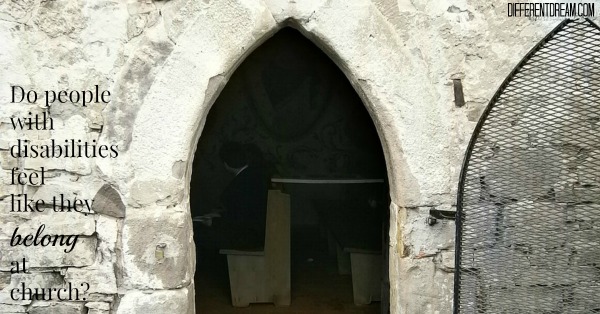Do Churches Make Special Needs Families Feel Welcome?

In May of 2016, the Summer Institute of Theology and Disability was held at Hope College in Holland, Michigan. The Institute featured a smorgasbord of presenters from around the country and the world who are passionate about including people with disabilities and special needs in faith communities.
My default mode at conferences is to take copious notes, which I did while listening to most of the presenters. But when Dr. Erik Carter, Professor in the Department of Special Education at Vanderbilt University and a Vanderbilt Kennedy Center Investigator, began to speak, I stopped writing. Because what Carter reported about what young people with intellectual disabilities and their families say about what it means to belong to a faith community was mind-boggling. And convicting.
Do Churches Make Special Needs Families Feel Welcome?
Carter’s statistics were impossible to digest while taking notes. So I sat back and listened, astounded. Later I emailed Dr. Carter and he graciously sent the hand out, his speaking notes and a copy of his scholarly journal article that was the foundation of his presentation. Here are the statistics he presented to answer the question: Do churches make special needs families feel welcome?
- 52% of all adults with intellectual and developmental disabilities have not attended a religious service (or some spiritual practice) even once in the prior month.
- More than 50% of parents report having kept their child with disabilities from participating in a religious activity because support was not provided.
- More than 66% of teenagers with special needs and disabilities do not attend any type of youth group or small group.
- More than 33% of parents report having changed their place of worship because their child was not welcome or included.
- Fewer than 20% of congregations were reported as offering support to children with developmental disabilities within religious education programs, hosting support groups for parents, or providing respite opportunities.
As a Christian commanded by Jesus to bring the children to him, I felt convicted, as every Christian should be when they read these stats. In the eyes of young people with intellectual disabilities, churches are failing them and their families. Many Christians have abandoned them to a spiritual void without a second thought.
Many, but not all. Those attending the Summer Institute in Holland work day in and day out to make faith communities around the country more inclusive. In his presentation, Dr. Carter outlined these 10 dimensions of belonging that must be implemented for people with and without disabilities to feel like they belong at church.
- They must be present at worship. In order to be present, they must be physically able to get in the building.
- They must be invited to worship by someone.
- They must be genuinely welcomed when they first attend a new faith community.
- They must not remain strangers but become known by others fairly quickly.
- They must be accepted as they are by congregational leaders and members.
- They must be supported, with congregational leaders at the forefront, with accommodations and opportunities to be involved in the full life of the faith community.
- They must be cared for spiritually, emotionally, and practically.
- They need to be befriended by others.
- They need to be needed, asked to serve along with others in the congregation.
- They need to be loved and valued by those around them.
That list should apply to every congregation, don’t you think? If your congregation doesn’t include people of all ages with disabilities, your congregation probably isn’t perceived by them as welcoming.
So the question is this: What can you and your faith community do to change the statistic quoted earlier by making everyone who comes through your doors feel welcome? If you’re looking for ideas, Every Child Welcome, co-authored by Katie Wetherbee and I, has plenty. And it has lists of other books and resources that can change how welcome people with special needs feel when they walk through your doors.
Do Churches Make Special Needs Families Feel Welcome Where You Live?
How welcome do you feel at church? Leave a shout out for your church or suggest positive ways churches can make families feel more welcome. Thanks!
Do you like what you see at DifferentDream.com? You can receive more great content by subscribing to the monthly Different Dream newsletter and signing up for the daily RSS feed delivered to your email.
By Jolene
Jolene Philo is the author of the Different Dream series for parents of kids with special needs. She speaks at parenting and special needs conferences around the country. She’s also the creator and host of the Different Dream website. Sharing Love Abundantly With Special Needs Families: The 5 Love Languages® for Parents Raising Children with Disabilities, which she co-authored with Dr. Gary Chapman, was released in August of 2019 and is available at local bookstores, their bookstore website, and at Amazon.
4 Comments
Submit a Comment
Subscribe for Updates from Jolene
Related Posts
The Lessons I Learned while Raising a Child with EA/TEF
Jolene Philo reflects on a lifetime of lessons learned while raising a child with EA/TEF and shares the insights she’s won.
Looking Back at Your Child’s EA/TEF Journey
Looking back at your child’s EA/TEF journey can give parents a new perspective about past events. Guest blogger Maggi Gale shares how her look back clearly showed her how God was with their family during their daughter’s very unusual first weeks of life in 2002. Three...
How Do I Let Go of My Adult EA/TEF Child?
Valeria Conshafter explores the question “How do I let go of my adult EA/TEF child?” for EA/TEF Awareness Month.






You have been fortunate, Rhonda. Wise advice about reaching out to those with disabilities. Thank you!
I would say I’ve been fortunate. Well accepted in 4 churches. Choir was a stretch
.
but it got figured out quickly. We must keep cognitive of intentionally reaching out to our disability brothers and sister.
Hi Bonnie, from what you said, your church is moving in the right direction. Finding volunteers can be a challenge. You and others in your ministry may want to consider attending the Accessibility Summit at McLean Bible Church next spring. They offer great workshops that may help your ministry develop. Here’s the conference link. There’s not much up there yet other than the dates, but it will be updated regularly as their planning continues. Jolene
I attend Manor Church, Lancaster, Pa. Our church has very good programs for people with disabilities of all ages directed by Mrs. Christie Hunt. Many people from out church are also involved with Joni and Friends Disability Ministry. It is hard to get everyone on board and as a result we don’t always have enough volunteers. We are striving to make it better. It is our prayer that all churches would do their best to welcome people with disabilities and include them in all of the church activitiesl